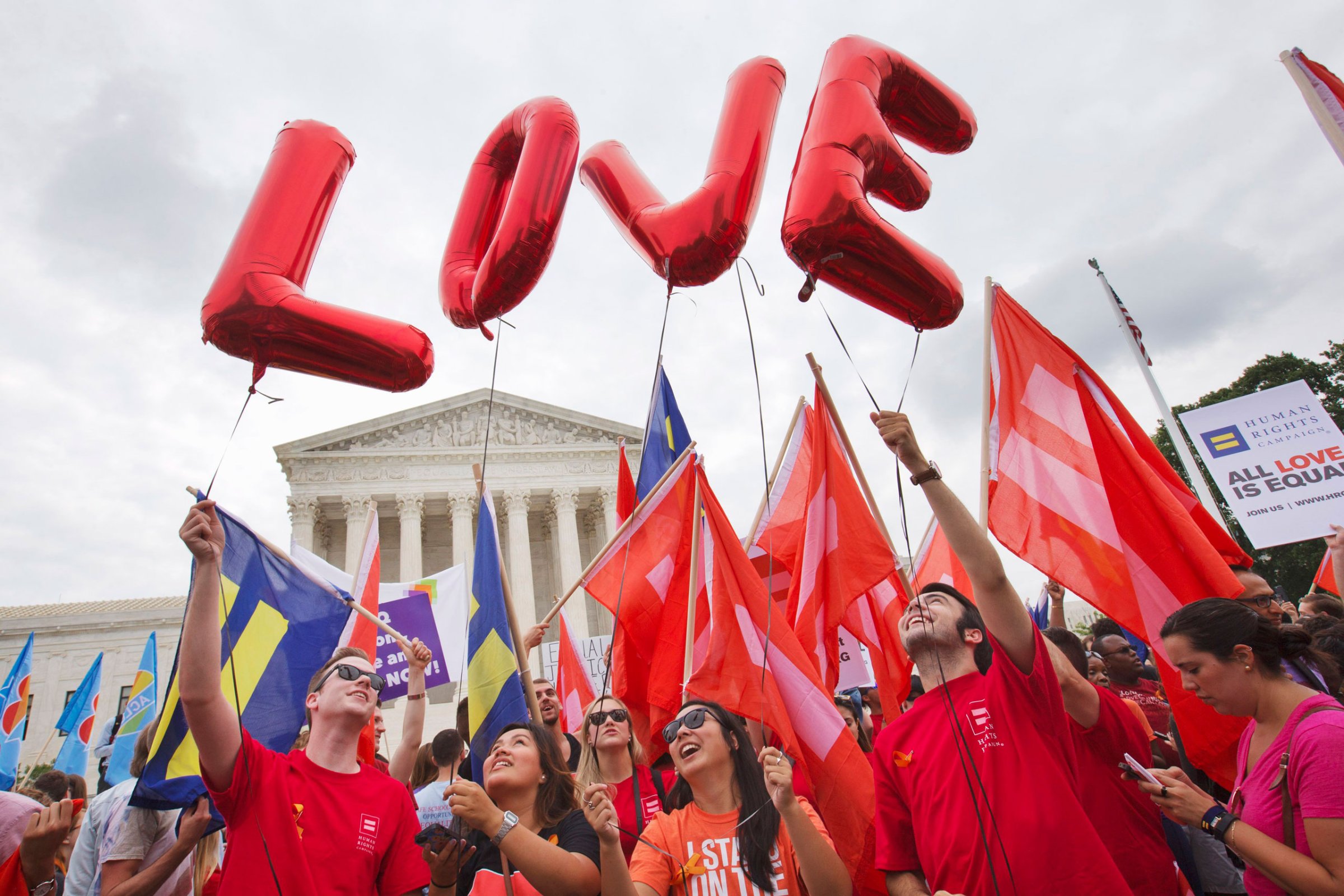
Bert Kubli faced the grand Supreme Court building, his left leg nervously bouncing as he waited for the Justices inside to hand down a ruling that would decide whether his marriage would be recognized throughout the country.
Seventy-five-year-old Kubli and 71-year-old husband Mark McElreath live in Washington, D.C., where their marriage is recognized, but there was still something more they wanted, an acknowledgment that their union meant the same as everyone else’s.
On Friday, the Supreme Court found that it did, ordering all 50 states to recognize gay marriage. And Kubli and McElreath’s first reaction was disbelief.
Standing in matching pink gingham shirts from Ralph Lauren, arms around each other, the septuagenarians watched Friday as the cheers rolled through the crowd gathered outside the marble Supreme Court building. Text messages and Twitter notifications were spreading the word and the flags and banners were being swung wildly overhead.
Still, they hesitated. “Could it be?” Kubli asked. The cheers kept growing, however, and Kubli finally gave himself permission to be joyful. “I assumed it might not happen,” he said with a sheepish shrug.
Outside the Supreme Court on Friday, the quickly growing crowd skewed younger, for sure. For many standing on the sidewalk, waving flags emblazoned with the equal sign that is the symbol of the Human Rights Campaign, the idea that gay marriage was controversial seemed ludicrous.
But for older members of the crowd, looking back on their own experiences, it was hard to believe how much had changed and how quickly. For the older generation, very real issues such as medical decisions and inheritance hinged on whether their relationship was codified as a marriage or not. It was a question that kept coming up for Kubli and McElerath. Both previously had been wed to women but now lacked many of the rights that their one-time wives had enjoyed. Others preferred to keep their personal lives private.
“I’ve been with my wife for 29 years,” said Cindy Lollar, a 56-year-old resident of College Park, Maryland. Never did she expect to have her relationship recognized in places like Alabama or Mississippi.
Lollar is preparing to retire but, as she is considering places to move out of the Washington area, the same question kept coming up: “Would we be safe there? Were there protections for us?” she said. “We weren’t safe everywhere.” For instance, if one fell ill, would one be able to make medical decisions for the other? “We were not given legal protections,” she said. “We wanted our rights.”
Nearby, 68-year-old Cindy Attwood was reading the decision on her iPhone, scanning Justice Anthony Kennedy’s ruling and giving high fives as she read parts of it aloud. “I’ve been waiting for 40 years for this, and now we are the same as anyone else,” the Fairfax County, Virginia, resident said. She and her wife have been together 19 years and were among the first to go to Vermont when that state became the first to offer same-sex unions. “This is what equality feels like.”
Outside the court, crowds continued to grow as word spread that the Supreme Court had affirmed the Constitution gives same-sex couples the right to wed. Many started shouting parts of the ruling. “No union is more profound than marriage, for it embodies the highest ideals of love, fidelity, devotion, sacrifice and family,” Justice Anthony Kennedy wrote. “In forming a marital union, two people become something greater than once they were.”
That was the sentiment Mickey Evans echoed as he stood with his husband Reggie Boyer outside the court. “This changes everything,” said Evans, a 46-year-old Air Force officer. The 43-year-old Boyer chimed in: “Our marriage is recognized,” something that was not the case during Evans’ three most recent military postings. The couple has been together 16 years but wed in Provincetown, Massachusetts, only in 2011, after the Pentagon scrapped the Don’t Ask, Don’t Tell policy that banned military members from serving while openly gay. “People knew who I am, but we didn’t dare (get married). We wanted to be like everyone else.”
Nearby, the crowd continued its celebration, waving giant blue-and-gold flags. Others spun flags in red, the color of love. The group spilled into the street between the Supreme Court and the Capitol. Many staffers from the Hill wandered over to what was becoming a pro-gay marriage rally.
Rep. Mark Takano was among them. The first non-white gay person elected to Congress, the California Democrat was walking through the crowd cheering the ruling. “We’re making history. We deserve this,” Takano said. “Think of the impact this will have on young people. They will grow up knowing they have the same rights as everyone else. They will never know a country where they could not get married.”
More Must-Reads from TIME
- Cybersecurity Experts Are Sounding the Alarm on DOGE
- Meet the 2025 Women of the Year
- The Harsh Truth About Disability Inclusion
- Why Do More Young Adults Have Cancer?
- Colman Domingo Leads With Radical Love
- How to Get Better at Doing Things Alone
- Michelle Zauner Stares Down the Darkness
Write to Philip Elliott at philip.elliott@time.com